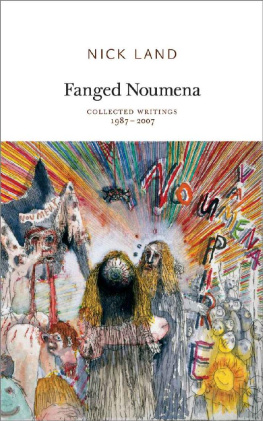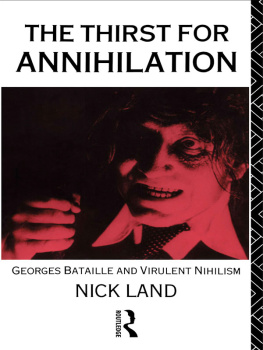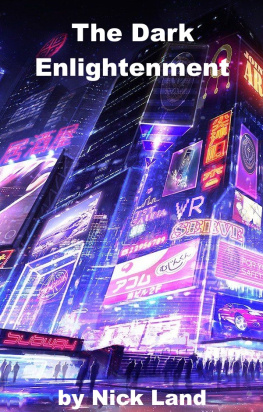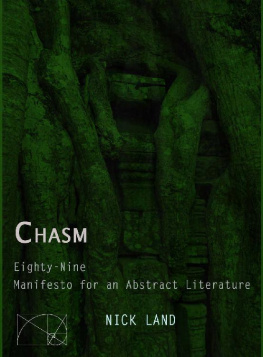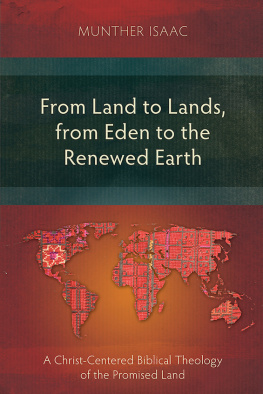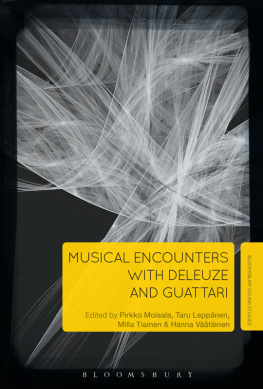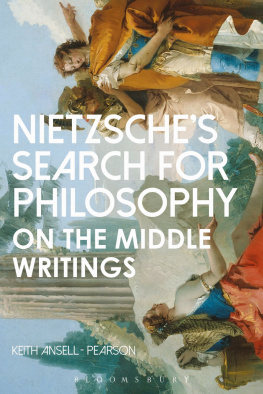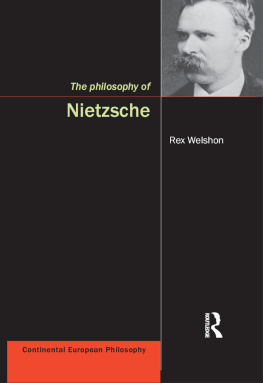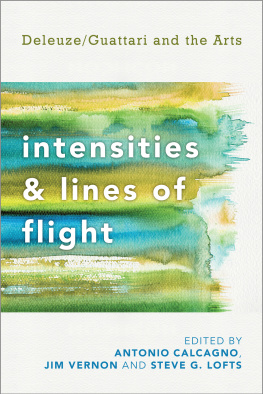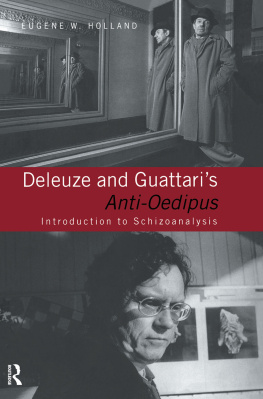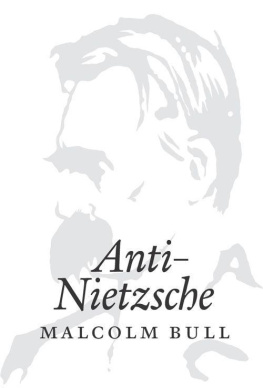Nick Land - Fanged Noumena: Collected Writings 1987-2007
Here you can read online Nick Land - Fanged Noumena: Collected Writings 1987-2007 full text of the book (entire story) in english for free. Download pdf and epub, get meaning, cover and reviews about this ebook. year: 2013, publisher: Urbanomic/Sequence Press, genre: Science. Description of the work, (preface) as well as reviews are available. Best literature library LitArk.com created for fans of good reading and offers a wide selection of genres:
Romance novel
Science fiction
Adventure
Detective
Science
History
Home and family
Prose
Art
Politics
Computer
Non-fiction
Religion
Business
Children
Humor
Choose a favorite category and find really read worthwhile books. Enjoy immersion in the world of imagination, feel the emotions of the characters or learn something new for yourself, make an fascinating discovery.
Fanged Noumena: Collected Writings 1987-2007: summary, description and annotation
We offer to read an annotation, description, summary or preface (depends on what the author of the book "Fanged Noumena: Collected Writings 1987-2007" wrote himself). If you haven't found the necessary information about the book — write in the comments, we will try to find it.
Fanged Noumena assembles for the first time the writings of Nick Land, variously described as rabid nihilism, mad black Deleuzianism, accelerationism, and cybergothic.Wielding weaponized, machinically-recombined versions of Deleuze and Guattari, Reich and Freud, in the company of fellow werewolves such as Nietzsche, Bataille, Artaud, Trakl and Cioran, to a cutup soundtrack of Bladerunner, Terminator and Apocalypse Now, Land plotted a rigorously schizophrenic escape route out of academic philosophy, and declared all-out war on the Human Security System. Despite his disappearance, Lands output has been a crucial underground influence both on recent Speculative Realist thought, and on artists, writers, musicians and filmmakers invigorated by his uncompromising and abrasive philosophical vision.
Long the subject of rumor and vague legend, Lands turbulent post-genre theory-fictions of cybercapitalist meltdown smear cyberpunk, philosophy, arithmetic, poetics, cryptography, anthropology, grammatology and the occult into unrecognizable and gripping hybrids. Beginning with Lands radical rereadings of Heidegger, Nietzsche and Kant, Fanged Noumena terminates in Professor Barkers cosmic theory of geo-trauma and neo-qabbalistic attempts to formulate a numerical anti-language.
Fanged Noumena is a dizzying trip through lands rigorous, incisive and provocative work, establishing it as an indispensable resource for radically inhuman thought in the twenty-first century.
Land had the most brilliantly seductive and meteoric mind, endlessly imaginative and capable of adopting, inhabiting and discarding any philosophical position. With him - and rightly so - philosophy infected every area of life, and sheer vitality of life reverberated in his thinking.
I see Fanged Noumena as a kind of righteous revenge. Nick was dismissed by professional philosophers because they simply didnt want to think and preferred their turgid academic complacency. I always admired him for his unwavering desire to take thought to its absolute limit and then see how much harder one could push.
Simon Critchley
These extraordinary texts, superheated compounds of severe abstraction and scabrous wit, testify to a uniquely penetrating intelligence, fusing transcendental philosophy, number theory, geophysics, biology, cryptography and occultism into startlingly cohesive but increasingly delirious theory-fictions.
Ray Brassier
This is theory as cyberpunk fiction: Deleuze-Guattaris concept of capitalism as the virtual unnameable Thing that haunts all previous formations pulp-welded to the timebending of the Terminator films. Lands machinic theory-poetry parallelled the digital intensities of 90s jungle, techno and doomcore, anticipating impending human extinction becoming accessible as a dance-floor.
Mark Fisher (K-Punk)
Nick Land: author's other books
Who wrote Fanged Noumena: Collected Writings 1987-2007? Find out the surname, the name of the author of the book and a list of all author's works by series.

